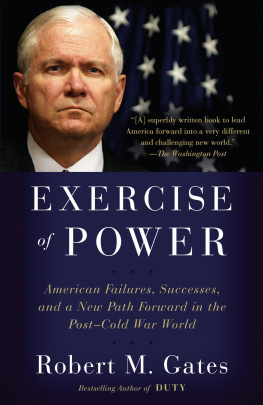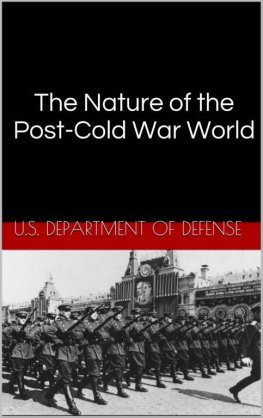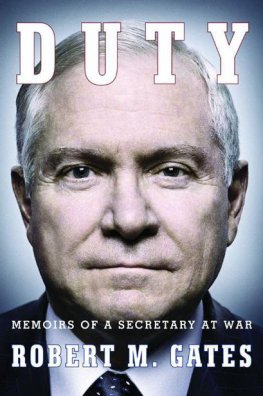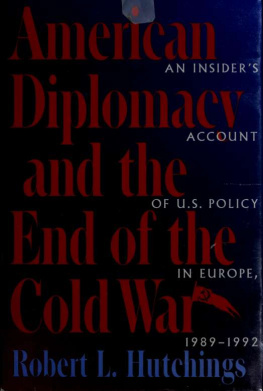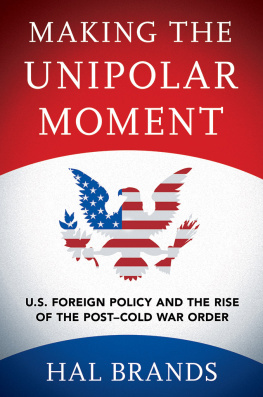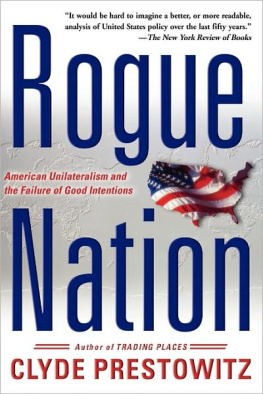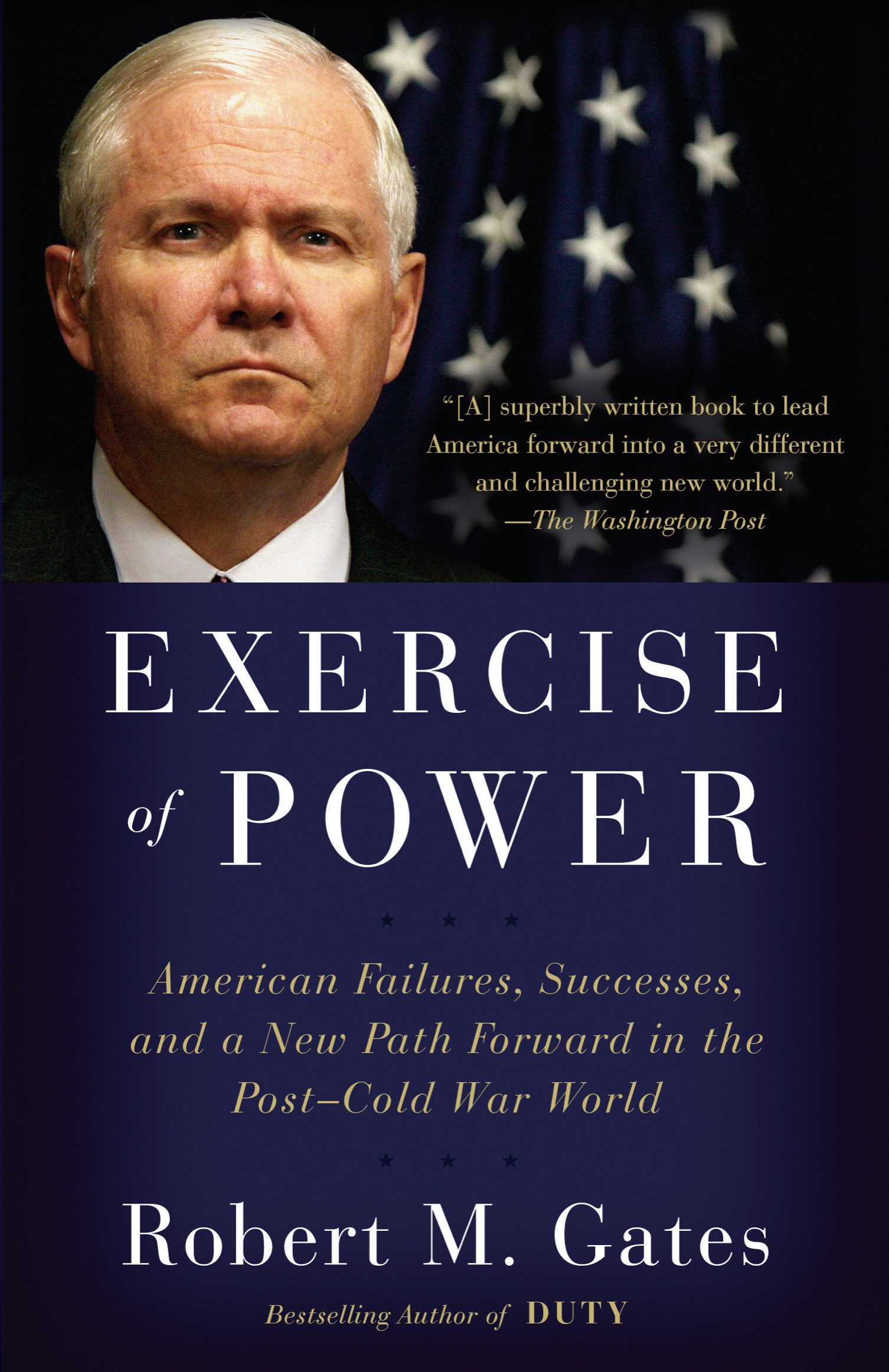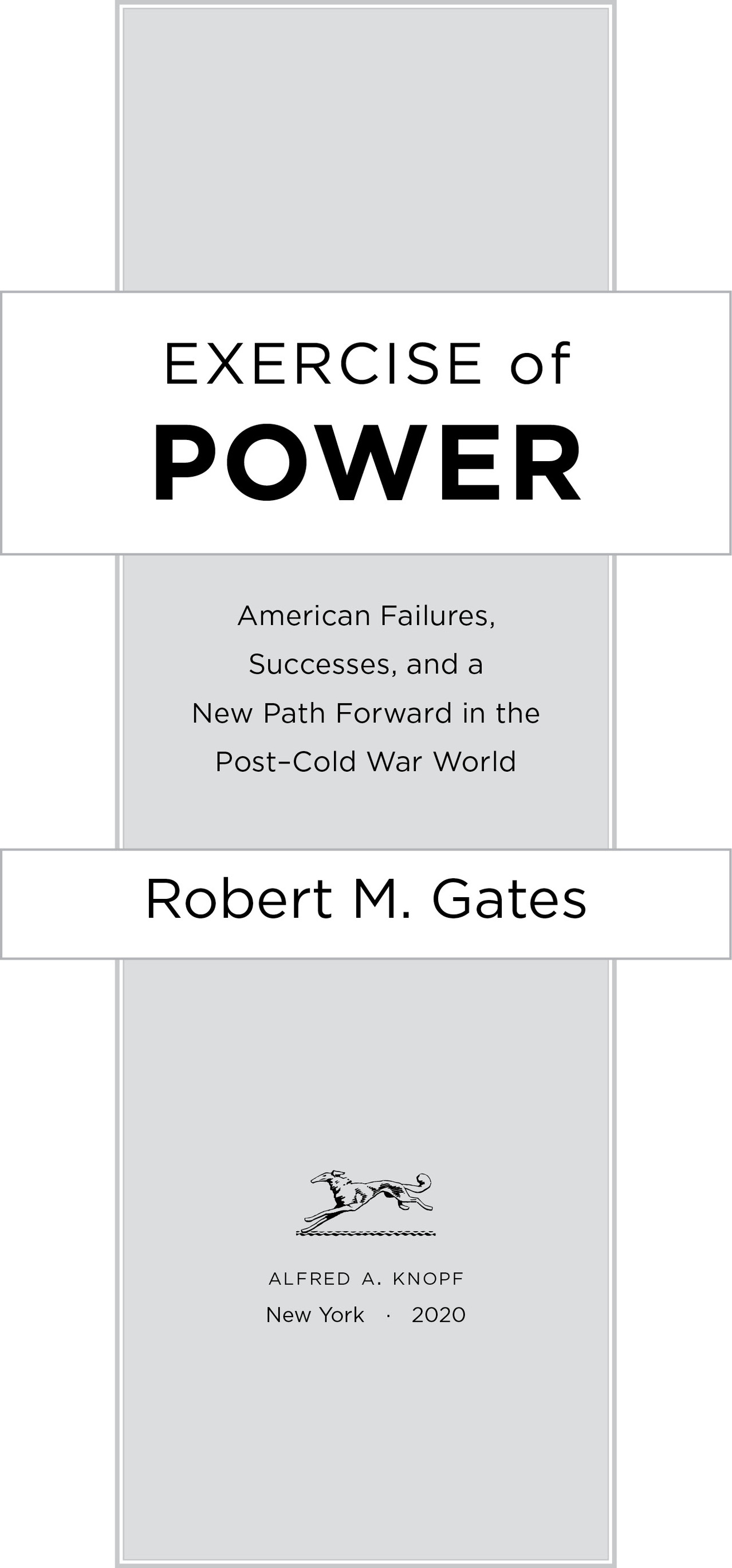Also by Robert M. Gates
A Passion for Leadership: Lessons on Change and Reform from Fifty Years of Public Service
Duty: Memoirs of a Secretary at War
From the Shadows: The Ultimate Insiders Story of Five Presidents and How They Won the Cold War
THIS IS A BORZOI BOOK PUBLISHED BY ALFRED A. KNOPF
Copyright 2020 by Robert M. Gates
All rights reserved. Published in the United States by Alfred A. Knopf, a division of Penguin Random House LLC, New York, and distributed in Canada by Penguin Random House Canada Limited, Toronto.
www.aaknopf.com
Knopf, Borzoi Books, and the colophon are registered trademarks of Penguin Random House LLC.
Library of Congress Cataloging-in-Publication Data
Names: Gates, Robert Michael, [date]- author
Title: Exercise of power : American failures, successes, and a new path forward in the postCold War world / Robert M. Gates.
Other titles: America and the postCold War world
Description: First Edition. | New York : Alfred A. Knopf, 2020. | Includes bibliographical references and index.
Identifiers: LCCN 2019057305 (print) | LCCN 2019057306 (ebook) | ISBN 9781524731885 (hardcover) | ISBN 9781524731892 (ebook)
Subjects: LCSH: United StatesForeign relations1989 | United StatesPolitics and government1989 | United StatesMilitary relations.
Classification: LCC E840 .G38 2020 (print) | LCC E840 (ebook) | DDC 973.929dc23
LC record available at https://lccn.loc.gov/2019057305
LC ebook record available at https://lccn.loc.gov/2019057306
Ebook ISBN9781524731892
Cover design by Joe Montgomery
Cover photograph Hadi Mizban/AFP/Getty Images
ep_prh_5.5.0_c0_r1
To Becky
We married young and have lived happily ever after
Contents
Prologue
On Christmas Day, 1991, the hammer-and-sickle flag of the Union of Soviet Socialist Republics was lowered for the last time over the Kremlin, and Soviet communism passed into history. On that day, the United States of America stood alone, unchallenged, at the pinnacle of global power. A mighty empire had fallen, the first in history to do so without a major war, leaving America in a position of power unique in modern history.
A year later, I stood at the wall of windows in my office on the seventh floor at CIA headquarters looking out at the Virginia countryside. It was cold and overcast. I was reflecting on my imminent retirement, stepping down as director of central intelligence in less than a month, twenty-six years after joining the agency as a rookie analyst working on the Soviet desk. I had lived through the many crises of the last half of the Cold War, never expecting to witness that conflicts end. On that wintry day in 1992, I thought about all I had seen and done working for six presidents, and wondered about the shape of the world to come. For someone The Washington Post had once characterized as the Eeyore of national security, able to find the darkest cloud in a silver lining, I was uncharacteristically optimistic.
As Bill Clinton raised his right hand to take the oath of office as our forty-second president on January 20, 1993, the United States singularly dominated the world militarily, economically, politically, and culturallyin every dimension of power. Not since the apogee of the Roman Empire had one country been in that position.
A quarter century later, the United States, while still the planets most powerful country militarily and economically, is challenged on every front. China is ascending and likely at some point to surpass the United States economically in terms of gross domestic product; Russia, modernizing its military apace, is aggressively threatening and attempting to destabilize Western democracies and dominate its neighbors; North Korea has become a wild-card nuclear power; the Middle East remains a sinkhole of conflict and terrorism. A savage civil war in Syria and the war against the Islamic State of Iraq and the Levant (ISIL) and its caliphate brought troops from Russia, Iran, Turkey, and the United States to the battlefield. After a military intervention led by the United States in 2011, Libya remains divided and engulfed in violence, and Iraq, invaded by the United States in 2003, still strives to create a sustainable, multiethnic government amid the ruins of most of its cities. Iran continues to strengthen its military capabilities, including ballistic missiles, sophisticated drones, cyber threats, and nuclear research, and intensifies its meddling from Lebanon and Syria to Yemen even as it ramps up its contest for religious and regional supremacy with Saudi Arabia. The war in Afghanistan seems endless. Our closest ally, Britain, is leaving the European Union, and authoritarian governments rule our NATO ally Turkey and are rising in Hungary and Poland. The multilateral institutions, alliances, and trade arrangements the United States created in its own self-interest in the decades after World War II have been weakened, in no small part by the very hand that created them, albeit by a president unlike any other. At home, our government is polarized, paralyzed, and seemingly incapable of addressing the manifold problems facing the country.
How did our country go so quickly from unique global power to a country that is widely perceived as no longer willing to bear the costs or accept the responsibility of global leadershipor even capable of governing itself effectively?
Answering how we got to where we are today internationally requires understanding the multiple forms of power that contributed to our achievement of historical singularity, and our earlier leaders skill in using those many and diverse forms of power along the road to that high point. The answer lies also in the mistakes of postCold War presidents and Congresses and, in particular, their failure to recognize, resource, and use the arsenal of nonmilitary assets that proved of critical importance in the long contest with the Soviet Union. It lies as well in their failure to understand that our place in the world in the decades ahead will depend for certain on a strong military but also on reimagining and rebuilding those nonmilitary tools. The answer is, essentially, the failure of too many of our recent political leaders to understand the complexity of American power, both in its expansiveness and in its limitations.
Dwight D. Eisenhower became president on January 20, 1953. During his two terms, the Soviet Union acquired the hydrogen bomb; there were repeated crises with China over Taiwan and the Taiwan Strait; the Joint Chiefs of Staff twice recommended using nuclear weaponsonce to help the French at Dien Bien Phu and once against the Chinese; there was a major war in the Middle East involving three of our closest allies (Britain, France, and Israel). There were revolutions in Soviet-dominated East Germany, Poland, and Hungary; a revolution in Cuba; and many lesser crises. The period was one of great tension in the Cold War with the Soviets. And yet, from the moment Eisenhower signed the armistice agreement ending the Korean War in July 1953 until he left office in January 1961, not one American soldier was killed in combat. American prestige stood high around the world. How did he manage that feat?
Eisenhower was the only postWorld War II president who was a career military officer, a five-star general who became commander in chief. He brought to the presidency great personal strengths, strategic insight, and leadership skills. He understood the uncertainties and risks always attendant to military operations. He knew the limits of military power in the nuclear age. He had the experience and confidenceand rankto tell his generals no. Above all, he grasped the importance of diplomacy, economics, communication, and the many other tools of influence. He understood and wielded power in all its dimensions.

